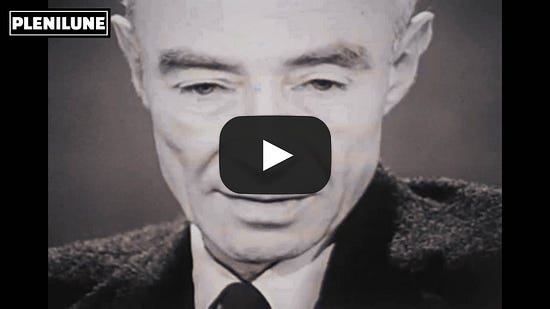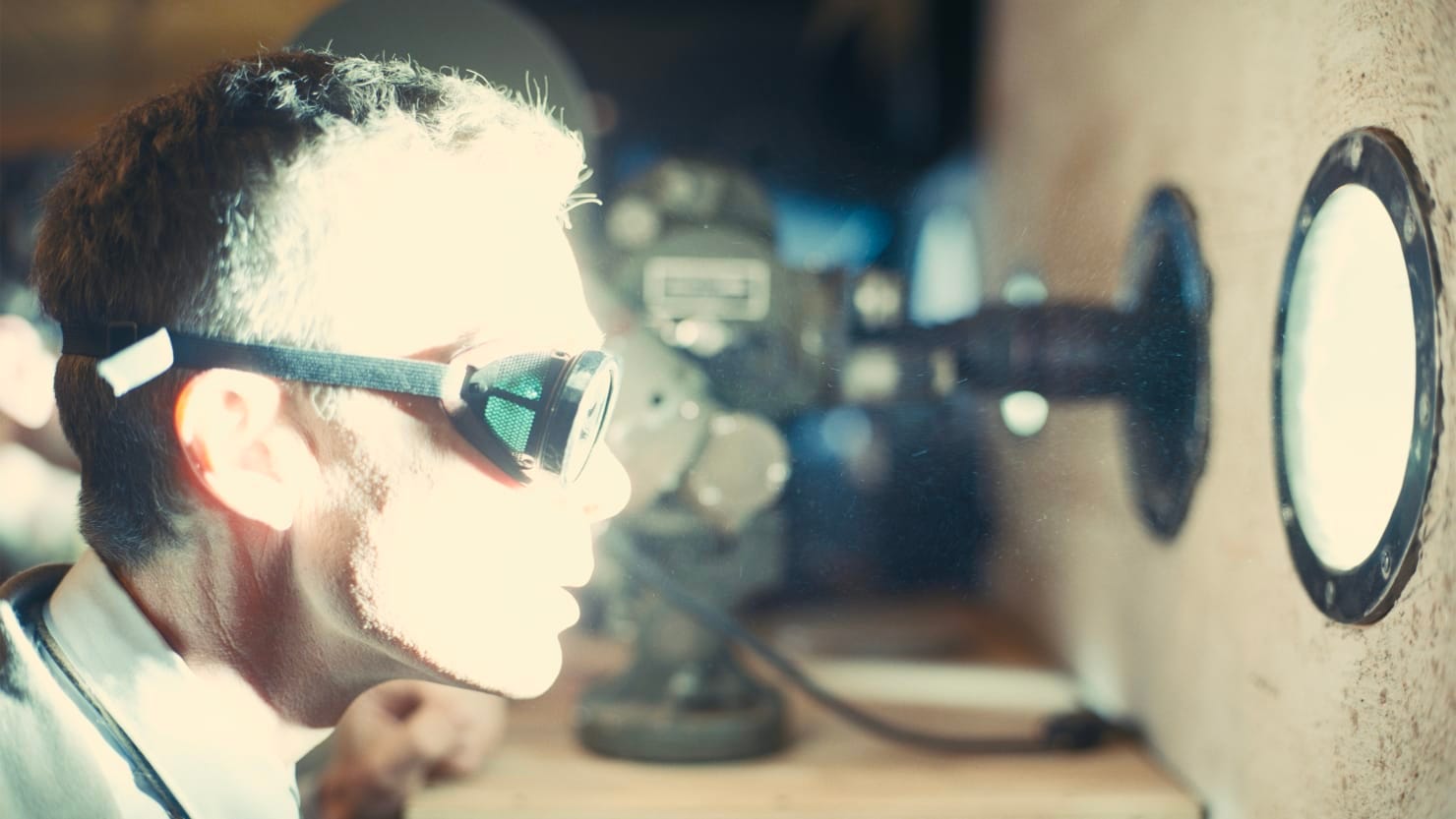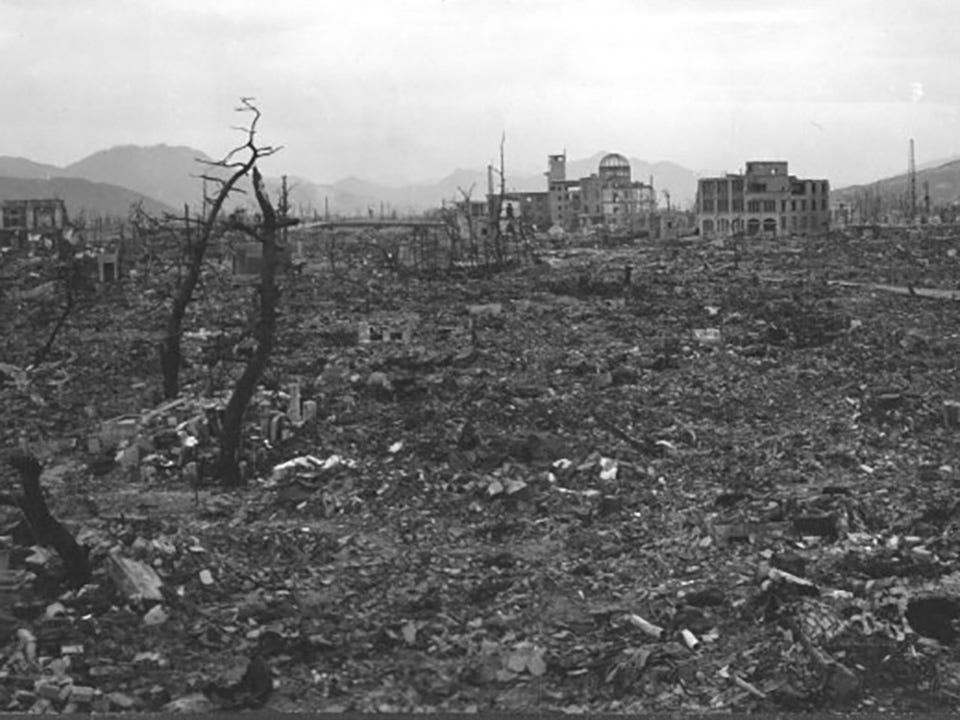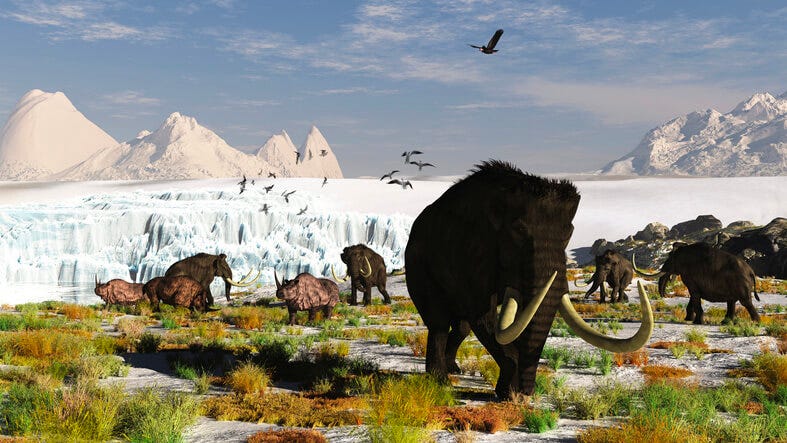|
We Are All Oppenheimer, Destroyer of Worlds
Oppenheimer loved the world but nearly ended it. We each have the same power. What will you choose?
What’s up this week
Passing the moral stress test, as Robert Oppenheimer eventually did, might be the key to saving the world. And, importantly, each of us can play an important role in our society’s ability to pass that test. I explain how in today’s newsletter below.
Some of the most prominent voices in Congress are attempting to undermine animal protection laws across the country, with the so-called EATS Act. The federal bill, which would repeal Prop 12 in California among many other state animal protection laws, is intended to “take on the animal rights activist and the attacks by the big blue state elitists.” Comical, if it weren’t so dangerous.
Speaking of which, Prop 12 is worth supporting — but it shouldn’t be confused with being humane. As we noted in a video published this week, the actual standards in the historic ballot initiative are far weaker than most people realize.
The Open Rescue Leadership Summit is coming up in just over a week from Aug 12-13 in Berkeley — and this will be your best (and perhaps last) chance to learn from the Sonoma County defendants on how we can all harness the power of open rescue. We have a great plan, including a new (Mass) Open Rescue Experience, as well as a Create-a-thon where you’ll be placed in teams to work on fun projects in defense of the right to rescue. On a personal level, this will probably be my last public event before I go into a figurative cave to prepare for trial. Hope to see you there.
“I am become Death”
Robert Oppenheimer, the father of the atomic bomb, has been described by director Christopher Nolan as the most important person who ever lived. By choosing to develop a weapon that was thousands of times more powerful than anything we had seen before, he changed the face of history.
But each and every one of us has a choice similar to the one that Oppenheimer made. As I explain below, we have the power to wreak unspeakable mayhem on tens of thousands of living beings in our daily choices. And Oppenheimer’s cautionary tale can teach us to use that power wisely. To ask: are our decisions benefiting those who are most powerful, or those who are most powerless?
I call this question the moral stress test. And if we don’t pass this test, it’s not just the animals who will suffer. We might just destroy the world.
When the United States military, the most powerful armed force in history, came to Robert Oppenheimer and asked him to build the first weapon of mass destruction, he felt obliged to assist. He believed in American democracy, and as someone of Jewish descent, he saw the unique threat posed by Nazism.
But something changed in him when he saw the power he had created. As the giant mushroom cloud emanated from the Trinity, the first successful test of an atomic bomb, Oppenheimer described how he and the other scientists reacted.
A few people laughed, a few people cried. Most people were silent. I remembered the line from the Hindu scripture, the Bhagavad-Gita… 'Now I am become Death, the destroyer of worlds.' I suppose we all thought that, one way or another.

This new bomb would go on to prove his words true. When dropped on two cities in Japan, it instantly incinerated tens of thousands of people, and slowly killed thousands more through radiation. The clothing of survivors was seared by radiation burns into their flesh, and the total death toll was over 100,000, including tens of thousands of children.
Oppenheimer was shaken by what he saw. He had spent his entire adult life building weapons for the powerful. But as he gazed on the burnt corpses of children, he made a realization: the measure of an ethical decision is not how it affects the powerful but how it affects the powerless. He was living his life to benefit the powerful generals who asked him to create a weapon; but what he truly wanted was to build tools that would benefit those who were powerless, such as the children killed by the atomic bomb. He went on to oppose the development of an even-more-powerful hydrogen bomb, and advocated for nuclear disarmament for the rest of his life.
The numbers prove we are all Oppenheimer
This story is now ascendant in popular culture, due to Nolan’s film on the same subject. What Nolan fails to explain, however, is that we are all Oppenheimer, when it comes to our power to destroy other living beings. Take, for example, the simple choice of what to eat. The average American consumes more than 7,000 animals in their lifetime, and these animals are raised in conditions that can only be described as “torture,” according to The New York Times.
The indirect consequences of our choices, however, are even more dire.
Take a recent example: the disruption of the thermohaline system in the Atlantic Ocean. This pattern of ocean currents, in which cold dense water in the North sinks down to be replaced by warm water rushing up from the South, has existed on this planet for 59 million years, sending life-nourishing nutrients and oxygen to the ocean deep. Importantly, it is also crucial to the Gulf Stream, as the warm ocean currents flowing north bring hot, humid air into the Northern Hemisphere.
But something deeply troubling has unfolded in the oceans in recent years: due to global warming, the thermohaline system is shutting down. The cold water in the North is no longer cold; it’s staying warm and therefore failing to sink. And the warming of ocean waters has now caused untold devastation to ecosystems, including the Florida coral reefs cooking in record 101.1 degree Fahrenheit water temperatures, it could shut down the Gulf Stream and ironically cause an Ice Age similar to the Younger Dryas event that occurred 10,000 years ago.
This can all seem very abstract until we imagine the experience of the living beings who are affected. And, as I have written previously, perhaps the greatest victim of human actions is the humble bristlemouth fish. This tiny deep sea fish – the size of a travel toothbrush – has been hauled up by the millions by massive fishing vessels trawling for larger prey. But recent studies have found stunning declines in their population, driven by warming waters. Heat, deoxygenation, and starvation may be killing off hundreds of quadrillions (yes, hundreds of quadrillions) of individual living beings.
And while it’s hard for us, as land-dwelling animals, to understand what these poor creatures may be suffering, imagine this scenario: a sudden change in the earth’s geology begins to cause hot lava to burst from underground. That is what the bristlemouth fish and other sea creatures are effectively facing across the globe, due to global warming. Warm water is bursting into their environment, and wreaking mayhem on their ecosystem.
We are literally the destroyers of their world.
While it’s hard to estimate any single human’s contribution to this decimation, a very conservative estimate might say that this sort of damage doubles each human being’s contribution to loss of life on this earth. Our individual death toll would then shoot up from 7,000 to around 14,000, and a mere 7 humans would have a death toll equal to a single Oppenheimer. This is what I mean when I say, we are all Oppenheimer.
Passing the moral stress test
But here is the key bit: just like Oppenheimer, we can reassess how we use our power. When Oppenheimer saw the devastation he wrought in Japan, he changed his mind about weapons of mass destruction. He saw that he wanted to use his power to benefit the powerless, such as the children incinerated by his bomb, rather than the powerful. And he became a powerful voice for peace, and perhaps one of the reasons the world was not destroyed in nuclear conflict.
Each of us has the same power. We can, of course, decline to consume the thousands of animals we are statistically destined to kill and consume. But even more importantly, we can devote our lives to assisting the powerless, rather than the powerful. And as with Oppenheimer, this will not just benefit those we immediately protect – the animals – but it will have systemic consequences on protecting all living beings. Because when we stop powerful tools – nuclear weapons, or factory farms and slaughterhouses – from being violently deployed against the powerless, we guarantee that they will not be violently deployed against anyone.
After all, if the system has proven robust enough to protect even those who cannot fight back, then it’s proven that it is a good one. It has passed the moral stress test.
Let me conclude by tying this conversation back to the present moment, and the trials that are rapidly approaching in Sonoma County (on Sept 8) and around the country (in Dane County, Wisconsin, or Niagara County, NY). The jury in each of these cases will wield incredible power. Not just to imprison me, and my co-defendants, for decades, but to shape the way our political system sees living beings for generations to come.
If they defend the idea that even the most powerless among us – a starving baby bird in a factory farm; a blind beagle puppy in a research facility – then our legal system will continue its long march towards justice. It will establish a precedent that can be used in court, in the halls of Congress, and even in our personal conversations that will shake the foundations of animal abuse across the globe.
But the moral stress test is not just a test for them. It is a test for all of us. How much are any of us willing to give to the powerless? The judge, the jury, and the entire community will not make the decision in court in isolation. Indeed, it’s not even the decision in court that matters most! Recall that Rosa Parks and Susan B Anthony both lost their criminal cases. But the nation, in both cases, passed the moral stress test where it mattered most: not in the court of law but the court of public opinion.
The people rallied, after Anthony’s conviction, to defend the right of women to vote. And they stood strongly, in buses, at lunch counters, and even on a march to Washington, for the right of every person, regardless of race, to equal protection under the laws. The defense of those who were powerless in each case became enshrined in our very Constitution.
We can do the same for animals. And I have much more to say about how each and every one of you can be part of that. But for now, let me just say this: if you want to learn more, and be a part of this, please make an effort to come to the Open Rescue Leadership Summit next week, and to the Sonoma Rescue Trial unfolding on September 8.


